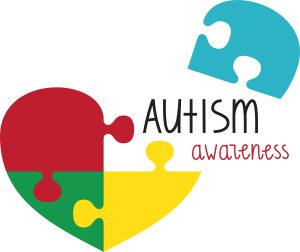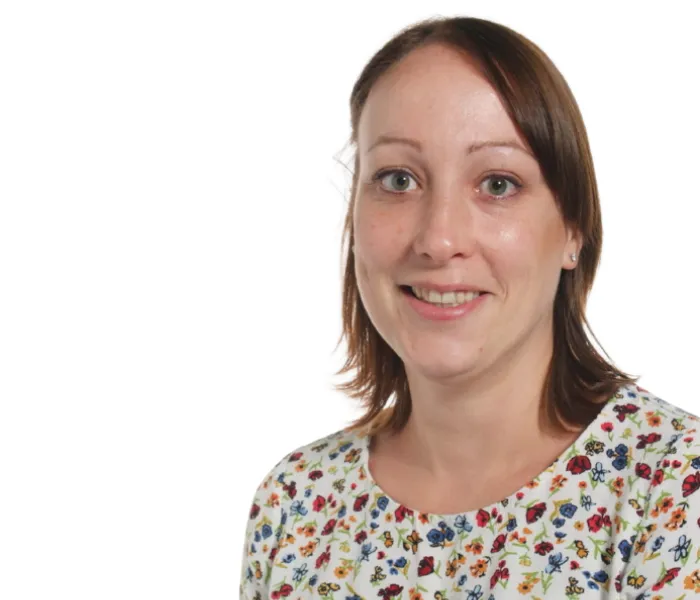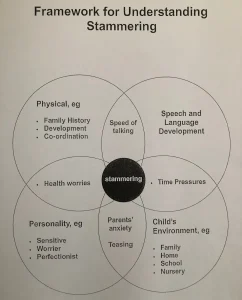According to the National Autistic Society, autistic children are three times more likely to be excluded from mainstream school, and more than 80% have experienced mental health issues within the education system in the UK.
Many have been dealing with even more challenging conditions over the last couple of years, including rapidly changing routines and circumstances that can be incredibly disruptive, disorientating and traumatic for those affected by autism.
To raise awareness around autism, one important characteristic felt for many individuals on the spectrum is the need for social camouflage: masking. A big challenge faced by someone with autism is fitting their lives into a neurotypical world, which is why you will see puzzle and jigsaw symbolism, encapsulating this human experience.

What is masking?
‘Autistic masking, camouflaging, or compensating is a conscious or unconscious suppression of natural autistic responses. It is hiding or controlling behaviours associated with autism spectrum disorder (ASD) that may be viewed as inappropriate in situations.’
[Autism Awareness Centre Inc.]
What are the signs?
- forcing or faking eye contact during conversations
- imitating smiles and other facial expressions
- mimicking gestures
- hiding personal interests
- developing a repertoire of rehearsed responses to questions
- scripting conversations
- pushing through intense sensory discomfort including loud noises
- disguising stimming behaviours
Raising awareness around masking is a great step towards building a safer community for people with autism spectrum disorder. It must be a group effort to break down a societal standard to ‘fit in’. To best describe the experience, a poem written by Virginia Betts articulates masking in a beautiful manner. This poem was recently published in The Spectrum Magazine, produced by and for Autistic people.
Autism Spectrum Conditions – Real Training
Having a theoretical and practical understanding of aspects of autism, like masking, makes a positive difference to young people with autism spectrum conditions. Fortunately, these topics and more are covered in our module; Autism Spectrum Conditions. It enables educators to bridge the gap and make a real difference to children and young people with autism.
The practice-led learning approach will arm you with the ability to give each autistic child in your care the best possible outcome through practice-led learning. Additionally, you will develop the relevant skills and knowledge to close the autism support and teaching gaps in your setting, and gain a critical understanding of the relevant theories, research and policies, and the ability to assess knowledge and existing practice.
If you have any further questions or queries about any of these courses or qualifications, please don’t hesitate to get in touch on +44 (0)1273 35 80 80 or info@realgroup.co.uk and we will be happy to help.
Catherine Burton – CPT3A, AAC
Catherine Burton has worked in education for over twenty years. She currently works in a Catholic Secondary School in West Yorkshire. Catherine has a keen interest in SEND, especially in Autism and Dyslexia.
Catherine studied the Certificate in Psychometric Testing, Assessment, and Access Arrangements with us.
What made you choose the Real Training courses over other options?
After doing extensive Google research, I chose Real Training. I was impressed with how clear and easy to navigate their website was. There was lots of background information about the group and clear information for each training course they had to offer.
What was your experience of learning with Real Training?
I thoroughly enjoyed my time with Real Training. My course tutors were incredibly helpful and patient. Even though they worked part-time, I always received replies to any queries on the same day I sent them. Talk about going above and beyond! It had been a while since I had done any training, but at no point did I ever feel unsupported. The customer care team were also excellent. I had a technical issue, which was entirely my fault, and it was dealt with quickly and efficiently.
How has the course helped make an impact at school?
The SEN department had gone through a complete staff change prior to my starting my role, as the previous two qualified assessors had retired. The school had to ‘buy in’ an assessor for the class of 2022 students because their Access Arrangement Applications had not been processed. My qualification has had a significant impact on the school. The knowledge I have gained has allowed me to audit the current documentation, resulting in four students now having Access Arrangements in place. We have also had several parents challenging the school about what support their child should get. The knowledge I have obtained has allowed me to advise the SENCO on what is and isn’t allowed. We now have two other staff members undertaking the course.
How has the course helped develop you as an educational professional and what do you hope to achieve with your new knowledge/skills in the future?
Having worked in education for over twenty years, I thought I had a fairly good understanding of the evidence needed for Access Arrangements and how applications are made. The course allowed me to increase my prior knowledge and ‘fill in’ the blanks, giving me a comprehensive understanding of the process from beginning to end.
Katie Lohan – CPT3A
Katie Lohan has been working in SEND for ten years and is currently based at an international School in Oman. Since joining her current school as a SENDCO working for students in early primary phase, she has done lots of work in literacy difficulties, speech and language, speech delay and engaging the children in picture communication.
She spends a lot of time working with parents of children experiencing SEND, helping them navigate the systems and empowering them with knowledge which is not readily available in the Middle East.
Katie studied the Certificate in Psychometric Testing, Assessment and Access Arrangements with us.
What made you choose the Real Training course(s) over other options?
When researching a course to undertake to gain qualifications for assessing, Real Training came highly recommended from many sources. As I am in Oman, a face-to-face course would not have been an option for me.
The flexible nature of the Real Training course was a huge advantage for me as a lot of courses available have live classes at times that don’t line up with our time differences. The option to complete at my own pace was a huge positive also due to a busy workload and online school delaying some of the sections for me. It was easily accessible at all times.
What was your experience of learning with Real Training?
From the very start, Real Training were great to deal with. I received my training manual in very quick time by the courier and was able to get started right away. The material in the manual was very well laid out and using it along with the online resources was great. The videos in particular I found very useful. The sample submissions and other downloadable documents were of great help also. The personal aspect to the course in terms of tutor feedback was excellent and one of the highlights for me. The feedback given was always constructive and supportive and well placed to guide and support. The forums where you could communicate with other participants was good also. It was comforting to read other’s thoughts and questions as often they were similar to mine. Campus Online was a very user-friendly platform and was always functional with no technical issues. This was reassuring when studying fully online. It was easy to navigate and well laid out section by section.
Across the board, the Real Training team must be commended for their commitment to its participants and the quality of courses.
How has the course helped make an impact at school?
Since completing the course I have successfully undertaken a schedule of different assessments to include the YARC, CTOPP2 and DASH. This was only possible through the experience gained in the CCET course. I have also put through a number of online applications for Access Arrangements for our GCSE students. The AAC section of the CPT3A was excellent in guiding me through the process.
How has the course helped develop you as an educational professional and what do you hope to achieve with the new knowledge/skills in the future?
As the only trained assessor in my school, it has been a great opportunity for me to develop in many skills particularly in assessing students of all ages. It has given me a lot more confidence in my assessing across the school. I hope to develop a coherent system of record keeping and assessment pathways for the school. Due to the school having no SENDCo up to now, this is something I will endeavour to achieve with the new qualifications to support me.
Ceri Matty – NASENCO
Ceri Matty has always had an interest in SEND, since she started her teaching career 18 years ago. It became more profound when her son was born in 2008 and as he started his school journey, his SEND needs became clear. He has had an EHCP since Year 2 (now in Year 9) and a diagnosis of ASD.
His journey, as well as Ceri’s own teaching, led her progressively into more depth in the study of SEND. This enabled her to better meet her students’ needs in class as well as ensure her son gets the very best support from his school.
Ceri studied the National Award for SEN Coordination with us.
What made you choose the Real Training course over other options?
As a full-time middle leader (not the named SENCO) and a parent of two, Real Training was the obvious choice for me. The delivery solely online meant that I could work flexibly around my work/life, whilst still achieving the same accreditation as a course that had face-to-face delivery. It came highly recommended on SEND teaching support groups I follow. The use of the online network, whereby you can share your thoughts, ask questions and offer support was fantastic and I actively encourage anyone using Real Training to utilise it.
What was your experience of learning with Real Training?
When I initially started, the course felt overwhelming. However, after reading advice from other delegates I quickly found that the organisation of the course and units were incredibly well structured. This was because the structure allowed me to work at my own pace and equally provided lots of links to online resources, articles and relevant legislation etc.
My tutor was fantastic, available for email or telephone support when required, and checked in when I had not logged in for a couple of weeks to see if I needed support. The course, once you get through the initial introduction unit, is incredibly easy to navigate. Tasks are progressive and provide a great mix of theory and practical opportunity. Strand 2 and 3, take time as you have to plan, implement and review projects within your setting, so I actively encourage delegates to look at these relatively early to plan into your year of study. As I work full time, I found it easiest to keep the actual assignment write-ups to the school holidays and use my face-to-face time to enhance my practical skills within the workplace.
How has the course helped make an impact at school?
Without hesitation, the support from the leadership team has been essential in the impact and outcomes. However, the knowledge that you develop enables you to motivate and enrich the learning of all staff within the school setting, which in turn enables them to support pupils with SEND. This ensures quality first teaching is at the forefront. SEND provision has and will continue to change based on the needs of those students in your setting – the course has made me realise that SEND is on an ongoing journey and I feel equipped with the tools and knowledge to ensure that the impact is not short term, rather sustained.
How has the course helped develop you as an educational professional and what do you hope to achieve with the new knowledge/skills in the future?
It has helped me develop a much higher depth of knowledge and understanding of SEND and will allow me to continue to develop within the school setting and beyond, ensuring that we continue to meet the needs of all our SEND students.
Anne Louise Davies – NASENCO
Anne is currently the Assistant Headteacher and SENCO at a mainstream 11-18 secondary school in Westbury, Wiltshire. When asked if she has any special interests in SEND, Anne explained “Dyslexia has become my most recent interest as I am interested in understanding more about phonological awareness and verbal memory.”
Anne completed the National Award for SEN Coordination with us at Real Training.
What made you choose Real Training over other options?
A colleague of mine had previously undertaken the NASENCO qualification through Real Training and recommended it. It also appealed to me as it was online learning and the assignment completion dates were not pre-set, offering me a huge amount of flexibility.
What was your experience of learning with Real Training?
My experience with Real Training has been extremely positive, and I have strangely really enjoyed the course and all the reading involved. It has been a long time since I have written an assignment, but I found the whole process easier than I had imagined due to the excellent structure and support from my amazing tutor, Clare. When you first start the course, it appears daunting, but the ‘tick box’ approach to completing the different elements is very satisfying, and the tracking tool that shows you how far through the course you are is also very motivational.
Consequently, I have now signed up for the Certificate of Competence in Educational Testing (CCET) course. Even though the course is all online and I have not met my tutor, I feel that the level of interaction has resulted in a relationship being established. Her feedback was not only extremely helpful but was also provided promptly, enabling me to make the necessary alterations while my research was still fresh in my memory.
How has the course helped make an impact at school?
The course has resulted in a complete reworking of our SEND provision. This started with a visit to my placement school, where I discovered how they developed their TAs and the types of intervention they offered. I was also able to improve publications on our website, including the SEND Information Report, so that they met the requirements of the Code of Practice. Reflecting on my leadership approach has allowed me to develop a style that has empowered the Teaching Assistants and given them a greater sense of responsibility. Basically, everything that is now in place is down to this course.
How has the course helped develop you as an educational professional and what do you hope to achieve with the new knowledge/skills in the future?
The course has added substantially to the amount of educational research I have undertaken and has offered views and opinions that I would not previously have considered. The new knowledge has been applied to my setting to improve the quality of our SEND provision. It is also a reminder of the importance of keeping my SEN knowledge up to date through academic research.
Emma Sison – CPT3A Intensive
Emma Sison currently works as a Deputy Examination Manager within a mainstream secondary school and sixth form in Suffolk, which has 1500 students. She has recently completed the CCET intensively with us and is now starting the AAC component of the CPT3A qualification.
When asked what her specific interest areas are within SEND, Emma explained that she is fairly new to the role but passionate about working alongside the school SENCO to support their students. We had a chat with Emma to see how she found her time on CCET and what her plans are once she has obtained the full CPT3A.
What made you choose the Real Training course over other options?
I originally found out about Real Training once I had been asked to do the qualification, and it was recommended by a few of my colleagues. It worked really well being able to complete it online and have it fit around my current work situation. The time they give you to complete the course is enough to give you the flexibility and work at your own speed.
I also found it was really useful to be able to do the online aspect and chat with others in the same or similar situations.
What was your experience of learning with Real Training?
The whole experience with Real Training has been amazing! Angela was fantastic at booking me onto both courses and answering all the questions I had.
The online platform for the intensive course and the module page was also great – easy to navigate and the resources were well put together. The tasks following the day course integrated all the learning into a great practical element, which tied everything together nicely. Being able to do the online training and be split into smaller groups for work was also useful, as it almost provided that face-to-face interaction.
I have now attended the one intensive day for AAC (currently working on this) and the three days for CCET. Both presenters and tutors were great, very responsive, and the feedback given was clear, relevant, and really useful for me going forward.
I honestly cannot thank the whole Real Training team enough for their support and commitment to everyone on the course. On top of this, it has given me a better understanding of SEND and what is involved in terms of AA.
How has the course helped make an impact at school?
Despite not having completed the full CPT3A, I have already been able to push for more test kits to be purchased and streamline the process a little bit with our SENCO, who is already a qualified EAA assessor. Once I am fully qualified, this will help a great deal.
As a non-teaching member of staff, I hope to be able to assess students as and when they are brought to my attention and ensure that support is in place early on in their studies.
How has the course helped develop you as an educational professional and what do you hope to achieve with the new knowledge/skills in the future?
It has been great to be learning again. The course has taught me a lot and given me the confidence to conduct educational testing.
I look forward to putting my qualification to use and conducting Access Arrangement Assessments in school. There are already talks for me to oversee AA in other secondary schools in our Trust too, which will be interesting for me to do.
Colette Davis – Leadership of Inclusive Practice

Colette Davis is the Leader of Inclusion for Beacon Hill School in Hong Kong. Her school have 540 students on roll with 21 spaces for students with more moderate needs. Leading a team of three teachers and seven assistants, Colette and her team aim to help support children and teachers to remove barriers to learning.
She is working toward gaining her Masters with Real Training. Having completed the Leading Inclusive Practice 60 credit module, she has gone on to begin the Gender and Sexuality and Social, Emotional and Mental Health modules.
Colette’s specialist interest areas of SEND are: Mental Health, Wellbeing, and Autism. Having recently completed a mental health first aid course and previous training in social thinking as a way to support. We caught up with Colette to see how her studies with Real Training have been going.
What made you choose the Real Training course over other options?
The tutor support was excellent. I enjoyed the variety of coursework, including readings, videos, and practical work. It was great to be studying again and having more rigour and ownership of my professional development. I enjoyed the interactions with some of the other students and was particularly interested in those who were also in international settings.
How has the course helped make an impact at school?
The course has had a direct impact on the work we have been doing at school in terms of inclusion. In the last two years, we have redefined what inclusion means to us as a school and changed our model moving forward. This has involved whole-school reflection, professional learning, and intense professional development days.
The course has meant that our approach towards the leadership of this change project and the measurement of its impact has been much more intentional. The timing was perfect. The change project that I shared and unpacked for this module was just a small part of the larger change project that we were already leading.
The impact has extended beyond the school as we have also had an opportunity to share within our wider foundation and at two international conferences.
How has the course helped develop you as an educational professional and what do you hope to achieve with the new knowledge/skills in the future?
I am looking forward to continuing my studies and deepening my understanding of a broad range of topics linked to inclusion. There is a big move in my organisation towards recognising and respecting Diversity, Equality, and Inclusion, and I look forward to Real Training helping me to dig deeper into this.
I have also been reflecting on my personal qualities as a leader and how I might become more intentional and inclusive in my approach.

October is International Stuttering Awareness Day. In light of this, we teamed up with Janet Stevens to bring you an informative article on Stuttering. Janet is an experienced speech and language therapist, independent practitioner and module leader on our Speech, Language and Communication Needs module.
This article highlights the different terminology you may hear, important facts, risk factors, and much more. If you are interested in any of the information below, please do feel free to leave any questions or feedback for Janet in the comment section at the end of this article.
Raising awareness on International Stuttering Awareness Day
Firstly, it is important to understand the differences in terminology: the speech difficulty known as stuttering in the USA & Australia, is more commonly referred to as stammering in the UK. The charity that supports & provides guidance for families, education & health agencies that have contact with children & adults who stammer in the UK is known as STAMMA. All of these terms can equally be encompassed within the descriptor of dysfluency.
Stammering is a neurophysiological speech disorder that appears to affect neural pathways in the speech-linked areas of the brain; it can be described as being like ‘a glitch in the wiring’.
A current definition of stammering is:
A voluntary disruption to the smooth flow & timing of speech, characterised by prolongation or repetition of sounds, blocking or secondary features.
This is what we know about stammering:
- It affects 5% of children under 5 years of age
- It affects 1% of the adult population
- It usually first manifests between the ages of 2 and 5 years of age
- It is not linked in any way to intelligence (IQ)
- It can be intermittent & appear to disappear for periods of time
- Early identification & referral to a Speech-Language Therapist (SLT) is essential to monitor & assess risk factors
Main Risk factors
- Family history of stammering: hereditary factors particularly strong with male relatives, although females can stammer
- Recognised difficulties with early speech/language/communication development OR significantly advanced language skills
- Time since onset of stammer: the longer the period of time between onset & consultation with SLT, the greater the risk that the stammer will become established
- Pattern of change over time: if child stammers every day, the risk of more permanent stammering is increased
- Parental levels of concern: the more anxious & concerned parents are, the greater the potential risk that early mitigating factors will not be effective
- Child awareness/level of concern: the higher child levels of concern/anxiety, the greater the risk that the stammer will become established
Triggers for Stammering
Multiple factors can interact with these main risks to trigger a stammer at any time; the circumstances will vary for individual children; however, none of these factors will cause stammering by themselves; individual children will already have an underlying deficit or predisposition or a stammer.
The factors to consider are:
- Language factors
- Psychological factors
- Environmental factors
- Physical factors
There is a Framework for Stammering that is used by the majority of NHS SLT teams & alternative diagnostic agencies, to inform their thinking about the specific factors involved in the stammer of individual children
This is also known as the Multifactorial Model: as the graphic illustrates all 4 factors interlink & overlap. SLTs will use this information to generate a Profile of Risk for each child, which will then inform the focus of intervention & act as the evaluation framework for that intervention.
Features of Stammering
- Repetition of sounds [usually word initial]: e.g. m.m.m.mummy
- Prolongation of sounds [usually word initial]: e.g. sssssunshine
- Blocking of sounds: e.g. trying to speak but no sound comes out
- Secondary features: e.g. eye blinking, twitching, facial grimaces
This list is a broadly chronological pathway of the typical evolution of childhood stammering. In terms of identification, generally stage 1 is auto-resolvable, whereas once stages 2/3 are reached, the risks multiply & the likelihood of the stammer becoming established is significantly increased.
Prevalence
Of the 5% of affected children:
- 2 of the 5 will experience transient difficulties with dysfluency between the ages of 3-5, which will resolve with no external intervention
- 2 of the 5 will experience significant dysfluency as young children, which will be resolvable via SLT intervention & guidance
- 1 of the 5 will become a chronic stammerer, through childhood into adulthood
Intervention Options
- Indirect Intervention: this could include guidance/advice for the family & ‘watchful waiting’ by the SLT, who would over review appointments if the family requested them
- Direct Intervention: the care pathways on offer across different NHS trusts in the UK will vary. In my own Trust, SLTs are trained to offer Parent Child Interaction sessions, Lidcombe Therapy sessions, Swindon Group Therapy sessions and referral to specialist intervention at The Michael Palin Centre in London. An individual child (& their family) will be guided onto one of these options initially, with the possibility of moving onto other options at a later date. This is not a sequential pathway, as each individual child & family are unique, so therapy packages will be uniquely designed around their needs.
Parent-Child Interaction
This intervention is based within the Hanen Approach: essentially it comprises short video clips of interactions involving a parent/significant adult & the child, which are then watched by the adult with discussions guided by the SLT to help identify areas of interaction ‘practice’, which could be ameliorated or changed, by the adult to minimise the child’s stammering behaviour [referring to the Profile of Risk].
Lidcombe Programme
This is a behavioural treatment mainly for children under 6 who stammer; there is no pressure within the treatment sessions on the child to consciously attempt to change any stammering behaviours. Parents are ‘trained’ to identify the number/severity of every stammered utterance [called ‘offering verbal contingencies’]; they do this in daily ‘treatment’ sessions AND in some ‘natural’ conversations. [https://www.lidcombeprogram.org]
Swindon Group Programmes
The SLT team in Swindon have devised, operated & trained other SLTs in a series of 3 different group therapy programmes. They combine intensive speech therapy in a group of peers with similar impairments with outdoor activities. These can be used sequentially & generally cover the ages from 6 up:
- The Smoothies Pack (6-9 years)
- The Blockbuster Pack (9-12 years)
- The Teens Challenge Pack (13-17 years)
[https://thefluencytrust.org.uk]
The Michael Palin Centre
As a centre of excellence in London, the team of highly skilled SLTs deliver intensive 2-week programmes for the families of the stammering child, as well as the child themselves. Group discussion, parent support and techniques to reduce stammering behaviour, combine in a challenging yet supportive environment to resolve often deep-seated family & personal issues, of which the stammer is frequently a manifestation. These courses require referral & local GP/NHS funding, so it can require years of effort to secure a place.
Advice for Parents and Supporting Adults (e.g. teachers)
- Remain open to communication about the STAMMER
- Do not react to the STAMMER in a negative way
- Wait for the child to finish talking, don’t interrupt or finish their sentences for them
- Don’t ask the child to stop & start talking again
- Praise the child for things they are good at/do well, using specific praise
- Praise the child when they talk ‘fluently’ or ‘smoothly’
- Maintain eye contact when communicating with the child whenever they stammer
- Slow down your own rate of speech
- Use pauses to give the child time to think & process information
- Don’t ask too many questions; use comments instead
In conclusion, if, as a professional educator, parent or relative, you become aware of a child stammering, please refer or encourage parents to refer the child immediately. The closer to onset a child can be seen by an SLT, the better the long-term outcome will be.
Rachel Trigg – CCET
Rachel Trigg currently works as a Learning Support Tutor at a university in Newport, Shropshire. Her specialist interest area of SEND is Dyslexia.
Rachel has recently completed our Certificate of Competence in Educational Testing course via the online route.
We caught up with Rachel to ask her some questions about her time studying with us!
What made you choose Real Training over other options?
I selected the Real Training course as I was looking to become a Dyslexia Assessor and this seemed one of the quickest and most direct routes. It was convenient in terms of online learning which meant I could work on it alongside my current job and also study at my own pace.
What was your experience of learning with Real Training?
I found the course excellent in terms of materials, assessment, and support. The first thing I received was the folder of resources, which was great to have as a source of reference that I could look back at if I was stuck on anything. There was a very comprehensive section on statistics that enabled me to understand and explain some of the statistical terminology used in testing. The videos were also helpful in explaining key areas, and it was useful to be able to refer to previous students’ work for help with assignments.
I also found methods of assessment on the course were relevant and practical, such as assessment reports and videos of testing or giving feedback. My tutor was really helpful throughout my time on the course. She responded quickly to any queries and also gave me constructive feedback on my assignments as well as motivating me to keep going even when I was finding things a bit hard!
How has the course helped make an impact at school?
It has been useful to share my updated knowledge of testing with my colleagues and for us to discuss the layout/requirements of assessment reports. I have also increased my confidence in administering tests to students and hope to continue building on this when undertaking my next course in Dyslexia Report Writing.
How has the course helped develop you as an educational professional and what do you hope to achieve with the new knowledge/skills in the future?
I have now enrolled on the Dyslexia Professional Report Writing module and hope to become a Dyslexia Assessor next year. I will then be able to undertake dyslexia assessments with students, enabling them to access support at University and to apply for Disabled Students Allowance, enhancing my positive impact.








